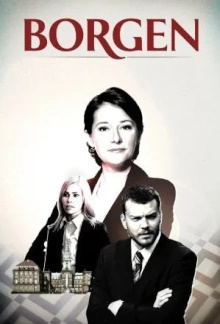I’ve had this on my list of potential television shows to watch for ages now as I keep hearing about how great it is. It’s four seasons in the Danish language so it’s quite an investment and I’m not sure how much my wife would appreciate a show that is all about politics. As it turned out there’s plenty of family and interpersonal drama in addition to the politics. The structure of the episodes in the first season has the main character Birgitte Nyborg needing to solve only one major crisis each episode, making it easy to follow. Most of all, it really does an excellent job of portraying how parliamentary politics works, albeit in a simplified capsule format, such that even we here in Malaysia can see the parallels. We will certainly be watching the remaining seasons.
Nyborg is the leader of a small center-left party the Moderates and her media advisor is Kasper Juul. A string of events and scandals involving the sitting Prime Minister Lars Hesselboe leads him to lose popularity. Nyborg benefits when during a live television debate she makes a personal, emotional appeal that voters interpret as being sincere. Though she is idealistic, she employs the cynical spin doctor Kasper Juul to help her rise to the post of Prime Minister. She also has to balance the demands of her role with her family, in particular the needs of her husband Phillip. Meanwhile Juul has an on again, off again relationship with television journalist Katrine Fønsmark. The first season covers Nyborg’s rise to power and approximately her first year in office. During that time, she has to deal with multiple crises including the US using a Danish airbase to conduct extra-rendition flights for possibly illegal prisoners, accusations that the Danish government spies on political opponents and possible corruption among her own ministers. But her greatest challenge is that her job strains her relationship with Philip to the breaking point and she finds herself changing due to the exigencies and compromises needed to stay at the top.
This is in many ways an oversimplification and has to fit within a visibly limited budget. The circle of people around Nyborg is far too small and the series’ primary way of showing that she is always busy is to have her attend countless meetings. In reality, her schedule should probably be packed full of ribbon-cutting ceremonies, community visits and the like. Even the number of ministers and their assistants she has to deal with in cabinet meetings is too small to be realistic. Throughout one year, she only has a single state visit and it is to Iceland. You can see how they needed to save money on extras and sets. Another oddity is that apart from Nyborg and her immediate family, the dramatic focus is on Juul and Fønsmark. The two have important roles in overall story of course but their private love lives seem hardly consequential compared to the day to day challenges Nyborg has to face. Perhaps they thought it was necessary to add the perspective of a more ordinary person in the street to the events but I’d have preferred to see more of the private lives of the other politicians and civil service leaders.
Even under these conditions, this series offers some of the best depictions of political life I’ve ever seen. There’s skullduggery as the characters meet anonymous callers offering information, blatant quid pro quo as Nyborg’s political allies ask for ministerial positions in proportion to current popularity, and most of all ethical quandaries aplenty. The most blatant example is Nyborg needing to foster a good relationship with an Eastern European dictator with an atrocious human rights record. Then of course, there’s all the manipulation of her public image through the media. She benefits at first from being perceived as a real person who speaks from the heart, letting the public see her true self. Yet once in power, she quickly learns the limits of this honest approach and when her family situation deteriorates how difficult it is to continue being open to the public. Finally it’s great how they use fictionalized versions of characters, companies and even countries but they’re all recognizably based on real world events. For someone who follows the news incessantly like me, it’s so satisfying.
As a Malaysian, one of the saddest things about this series is how mild and insignificant their scandals and wrongdoing are by our standards. I mean buying an expensive handbag using a government credit card that is instantly paid back afterwards is nothing. So is having a representative of the Prime Minister oversee the editing of a television interview. I also don’t think that day to day popularity matters that much when the next election is still so far out. I’m looking forward to what comes next and hopefully it can keep up with this level of quality and realpolitik. It doesn’t even matter that you know nothing about Denmark and its politics because the issues and conflicts are the same all over the world. Highly recommended.
